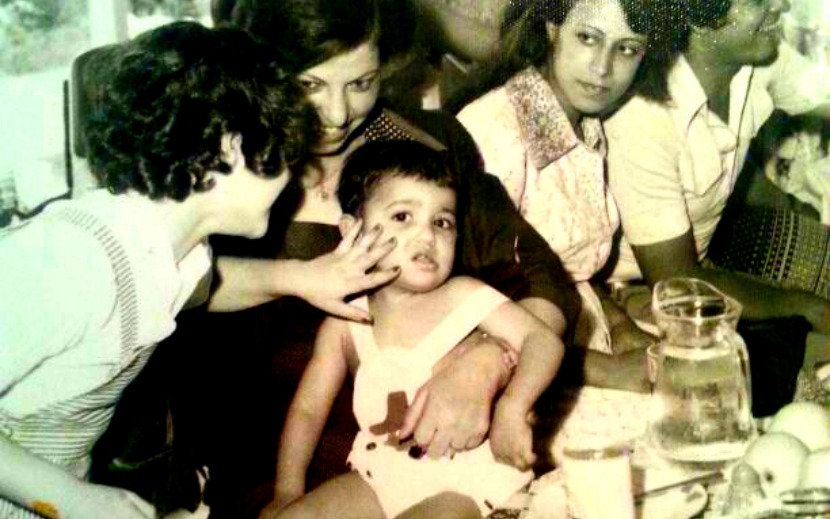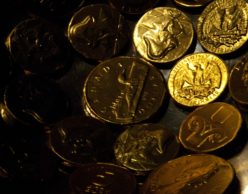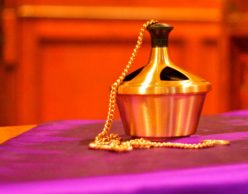Why Full Disclosure’s Roben Farzad Always Pays for His Parents

Our dear Iranian-Jewish-American Mash-Up Roben Farzad immigrated with his family to the U.S. from Iran in 1978, settling in Miami. He went on to serve as a cultural and financial translator for his parents, and eventually the general populace, as a journalist at publications such as Bloomberg Businessweek, The New York Times, The Wall Street Journal and a frequent guest on CNN, PBS, CNBC and others. He is the creator of Full Disclosure, a weekly radio show that blends culture with business and personality with finance. We’d like to smack him with a bunch of scallions. Listen to his show, follow him on Twitter, and learn how a Tanzanian royal became a doorman and day trader in New York.
The Mash-Up Americans: First, our Mash-Up Speed Round Questions! Who are you?
Roben Farzad: I’m a renegade of funk (funk).
How do you mash up?
I’m an Iranian Jew who speaks Spanish living in Richmond, Va., the one-time capitol of the Confederacy. I like to fix up my friends and get very different restaurants to collaborate on bizarre lovechild dishes. Moreover, I adore RC Cola.
Where do you feel most at home?
Holding my children. Smelling their hair.
What is your comfort food?
Persian food: Kabobs w rice, Shirazi salad and tadig (the crunchy bottom of the rice pot). Those of you in Manhattan have to hit the joint Ravagh. Those in the DC area should try this at Shamshiri.
What do you call your grandma?
Mamangigi was her name…she passed away in 2009. When we left Iran, she made me a red blanky that I could only part ways with at age 22. I see her smile and sarcasm in my son.
What is your bubbemeise? [Editor’s note: See Korean Fan Death.]
Jews can sanction strictly kosher Bacon bits! It’s true.
Speaking of bacon, let’s talk about who brings it home and how. How did you first learn about how money works?
When I was five, I casually shoplifted orange Tic-Tacs at the grocery checkout. I then proceeded to offer them to Dad on the ride home. He nonchalantly u-turned, walked me to the customer service counter and demanded the manager let me take the mic to apologize to the store. For good measure, Dad, ever the patriot, made me recite the Pledge of Allegiance. The poor manager was, like, “Sir, you really don’t need to do this. He can keep them.” But Dad gave me a dollar and I paid the manager. Never again did I touch Tic Tacs.
How many languages can you say “money” in? How many languages do you speak, anyways?
Three languages: English, Farsi and Spanish. In New York, a Korean co-worker taught me how to accost shop owners for a discount. I walk in to a dry cleaner or corner store, do a tomahawk chop and yell: “I love Korea. Everything Korean. Now, hook me up w/ a discount, sister!” [Editor’s note: It’s true, and it wasn’t even Amy.] And I once pulled this stunt.
How would you define your family? Working class, middle class, upper middle, professional, educated, intellectual?
Proud workers who value education and family above all else.
Do you think how your family deals with money has more to do with being an immigrant, or being Persian, or being Jewish?
I come from a long line of illiterate merchants. My Dad’s father completely mortgaged his life to break the cycle and send his children to medical school. Iranian-Americans as a whole, I find, still stick to old half-truths about the can’t-lose nature of property, oil and gold. They are skeptical of the stock and bond markets. Many — particularly in “Tehrangeles” — still do self-destructive things like taking out loan-shark loans to marry off their daughters in spectacularly wasteful fashion. I’m grateful we opted for the East Coast stay-in-school route over the West’s Shahs of Sunset track.
How do you think your family’s immigrant experience shaped their relationship to money?
When you lose everything you’ve inherited and everything you’ve worked for to give your child a better life in America, you take nothing for granted and cherish financial self-determination.
Do you pay for your parents? [Editor’s note: We agonize over it here.]
I do. I owe them so much. We fight over every dinner out, every plane ticket.
Was your family a cash family? A credit family? A put-it-all-in-the-bank family?
All cash. No credit = no problem.
Do they trust others with their money? Do you?
I wouldn’t trust Mother Teresa with my parents’ savings.
How does your background shape how you report on money, and the questions you ask about it?
It informs everything I do. In hindsight, I first became a journalist at age 6, when I’d fill in my parents on world affairs, science and Burger King’s horse meat secret when they picked me up from the school bus stop. I still judge my efficacy as a journalist in terms of how well I can explain things to Mom and Dad — and my kindergarten teacher.
How do you see culture has shaped how different guests you have talk about money?
Just listen to all the shows we’ve done so far. See, for example, how my old day trading doorman from New York had to shed much of his world view as Tanzanian royalty in order to reshape himself as a successful U.S. investor.
What IS money to you? Power? Security? Duty? Another kind of currency?
A placeholder for status and power that too often distracts us from the important things.





